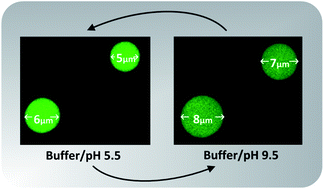We have studied swelling properties and stability of protein particles prepared through emulsification and heat-induced gelation of whey proteins under different conditions. The protein particles themselves are stable over a wide pH range, but around pH 5 aggregation was observed, presumably because of a weakened electrostatic repulsion close to the protein iso-electric point. Protein leakage from the particles was found not to be higher than 8% (w/w) in most of the pH range, but increased significantly at alkaline pH. The pore size of the particles is in the range of 4 to 20 nm at neutral pH and the particles show a pH- and salt-responsive swelling, due to their polyampholytic character, as shown by confocal scanning electron microscopy analysis. These results indicate that these whey protein particles could be used as targeted delivery vehicles. The pH sensitive swelling of the particles may also result in significant changes in the volume of the particles, thereby influencing the rheological properties of dispersions made out of these particles, especially in concentrated systems.
